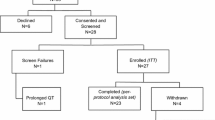Abstract
Vorozole (RivizorTM), is a triazole derivative and one of the new, third generation aromatase inhibitors. Vorozole causes reversible inhibition of cytochrome P450 aromatase with the majority of the aromatase inhibition activity attributable to the dextro-isomer. In vitro the IC50 against human placental aromatase and in cultured rat ovarian granulosa cells is 1.38 and 0.44 nM, respectively. Vorozole is selective and does not effect other cytochrome P450-dependent reactions at concentrations up to at least 500-fold the aromatase inhibiting concentration. In vitro vorozole, at concentrations of up to 10 μM, does not exhibit agonistic or antagonistic effects on steroid receptors including the estrogen, progestin, androgen and glucocorticoid receptors. In vivo vorozole produces dose-dependent inhibition of aromatase and reduces circulating estrogen levels. Vorozole has been shown to inhibit intratumoral aromatase activity in postmenopausal breast cancer patients pretreated for 7 days prior to undergoing mastectomy. Tissue estrone and estradiol levels were also shown to be decreased by 64% and 80%, respectively. In four phase II clinical trials, vorozole produced response rates of 18–33% corresponding to selective inhibition of estradiol. Vorozole has been examined in large, randomized multi-centre, controlled trials against both megestrol acetate (MA) and aminoglutethimide (AG) plus hydrocortisone. Against MA, response rates were comparable (10.5% vorozole; 7.6% MA) however, a trend towards improvement in median duration of response for vorozole (18.2 versus 12.5 months; p=0.07) was shown. No differences in time to progression or survival were noted. Significant and persistent weight gain associated with MA administration was the most notable difference in tolerability between the two agents. Against AG, vorozole showed a higher response rate (23% versus 18%) however this did not reach statistical significance (p=0.085). No differences in duration of response, time to progression and survival were noted. A significantly better Functional Living Index-Cancer (FLIC) quality of life score was associated with vorozole compared to AG. Vorozole is a specific, selective and potent aromatase inhibitor and useful for postmenopausal patients with advanced breast cancer.
Similar content being viewed by others
References
Wouters W, De Coster R, Van Dun J et al.: Comparative effects of the aromatase inhibitor R76713 and of its enantiomers R83839 and R83842 on steroid biosynthesis in vitro and in vivo. J Steroid Biochem Mol Biol 37: 1049–1054, 1990
Vanden Bossche H, Willemsens G, Roels I et al.: R76713 and enantiomers selective, nonsteroidal inhibitors of the cytochrome P450-dependent oestrogen synthesis. Biochem Pharmacol 40: 1707–1718, 1990
Wouters W, De Coster R, Beerens D et al.: Potency and selectivity of the aromatase inhibitor R76713. A study in human ovarian, adipose stromal, testicular and adrenal cells. J Steroid Biochem 36: 57–65, 1990
Vorozole (R083842) Investigator's Brochure. Third edition, May 1995
De Coster R, Wouters W, Bowden CR et al.: New non-steroidal aromatase inhibitors: focus on R76713. J Steroid Biochem Molec Biol 37: 335–341, 1990
Dowsett M, Stein RC, Mehta A et al.: Polency and selectivity of the non-steroidal aromatase inhibitor CGS 16949A in postmenopausal breast cancer patients. Clin Endocrinol 32: 623–634, 1990
Wouters W, De Coster R, Krekels M et al.: R76713, a new specific non-steroidal aromatase inhibitor. J Steroid Biochem 32: 781–788, 1989
Wouters W, Van Ginckel R, Krekels M et al.: Pharmacology of vorozole. J Steroid Biochem Molec Biol 44: 617–621, 1993
Tuman RW, Morris DM, Wallace NM et al.: Inhibition of peripheral aromatization in the male cynomologus monkey by a novel nonsteroidal aromatase inhibitor (Ro76713). J Clin Endocrinol Metab 72: 755–760, 1991
Hoggins C, Grand LC, Brillantes FP: Mammary cancer induced by a simple feeding of polynuclear hydrocarbons and its suppression. Nature 4760: 204–220, 1961
Rose DW, Pruitt B, Stauber P et al.: Influence of dosage schedule on the biological characteristics of N-nitrosomethylurea-induced rat mammary tumors, Cancer Res 40: 235–239, 1980
De Coster R, Van Ginckel RF, Callens MJL et al.: Antitumoral and endocrine effects of (+)-vorozole in rats bearing dimethylbenzanthracene-induced mammary tumors. Cancer Res 52: 1240–1244, 1992
van der Wall E, Donker TH, de Frankrijker E et al.: Inhibition of the in vivo conversion of androstenedione to estrone by the aromatase inhibitor vorozole in healthy postmenopausal women. Cancer Res 53: 4563–4566, 1993
de Jong PC, van de Ven J, Nortier HWR et al.: Inhibition of breast cancer tissue aromatase activity and estrogen concentrations by the third-generation aromatase inhibitor vorozole. Cancer Res 57: 2109–2111, 1997
Johnston SRD, Smith IE, Doody E et al.: Clinical and endocrine effects of the oral aromatase inhibitor vorozole in postmenopausal patients with advanced breast cancer. Cancer Res 54: 5875–5881, 1994
Goss PE, Clark RM, Ambus U et al.: Phase II study of vorozole (R83842), a new aromatase inhibitor, in postmenopausal women with advanced breast cancer in progression on tamoxifen. Clin Cancer Res 1: 287–294, 1995
Goss PE, Walde D, De Coster R et al.: Rivizor — a new third-generation aromatase inhibitor for the treatment of advanced breast cancer after tamoxifen failure. Manuscript submitted
Patidaens R, Piccart M, Nooij M et al.: Phase II study of vorozole (R83842), a new non-steroidal aromatase inhibitor, in advanced breast cancer. EORTC Breast Cancer Cooperative Group [abstract]. Eur J Cancer A 30ASuppl 2: 23, 1994
Iscobelli S, Boccardo F, Amoroso D et al.: Phase 2 study with vorozole as 2nd line treatment of post-menopausal patients with advanced breast cancer: preliminary results of a multicentred study [in Italian] [abstract]. Tumori 31:80 Suppl 80, 1994
Goss P, Winer E, Tannock I et al.: Vorozole versus Megace® in postmenopausal women with metastatic breast carcinoma who had relapsed following tamoxifen. Proc Am Soc Clin Oncol 33: 155a (Abstract No. 542), 1997
Bergh J, Bonneterre J, Illiger HJ et al.: Vorozole (Rivizor™) versus aminoglutethimide (AG) in the treatment of postmenopausal breast cancer relapsing after tamoxifen. Proc Am Soc Clin Oncol 33: 155a (Abstract No. 543), 1997
Rights and permissions
About this article
Cite this article
Goss, P.E. Pre-clinical and clinical review of vorozole, a new third generation aromatase inhibitor. Breast Cancer Res Treat 49 (Suppl 1), S59–S65 (1998). https://doi.org/10.1023/A:1006052923468
Issue Date:
DOI: https://doi.org/10.1023/A:1006052923468



